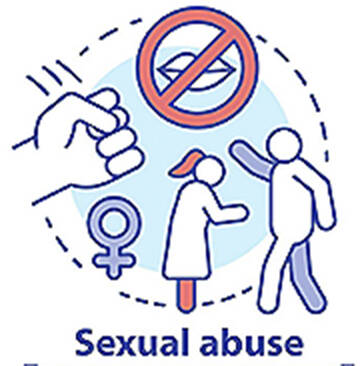What happens when minors are victims of sexual assault? How do they report the crime and who can help?
When topics like those aren’t openly discussed, young people may not know who to turn to, or even understand the complicated process of reporting an assault when their life has been turned upside down.
Recently, a group of community advocates came together on Zoom for the first in a series of discussions about child victims of sexual assault to educate parents about the agencies and people available to help.
On Feb. 8, Bainbridge High School principal Kristina Rodgers along with Bainbridge Youth Services mental health expert Helen Burke, BI Police Department community health advocate Kelsey Lynch, and Beverly Van Santford from the Kitsap Sexual Assault Center participated in a panel discussion on those sensitive topics.
Rodgers said reporting a sexual assault can happen in a variety of ways: by speaking to a teacher, counselor at school, a therapist or a law enforcement officer. But, when such a report is made at school, kids need to know that teachers and staff are mandatory reporters and they are not the investigators.
Certain incidents must be reported to Child Protective Services and law enforcement, including sexual assault or abuse. It can be difficult when kids want to speak in confidence with an adult about something traumatic, not realizing that the adult is required to pass certain information along to CPS or law enforcement.
Rodgers said teachers and staff, “Don’t want to break that trust,” so the school counseling team is educating students that a report of sexual assault, harassment, intimidation and bullying will lead to an investigation. The district’s role is to partner with law enforcement when a student wants to file a report and to help that student feel safe at school, especially if the assault took place with an individual there. In that instance, Rodgers will create safety plans to ensure students have what they need during the police investigation.
Students need to know that the school district won’t expel, suspend or exclude students from school based on an allegation. “It’s based on due process in the law. Everybody gets their day in court, and everybody gets to tell their story,” Rodgers said.
Burke assists kids between the ages of 13-21 and works closely with BHS students. “As a mental health counselor, confidentiality is my highest ethical responsibility,” said Burke, who is also a mandated reporter and always tells clients that during the first counseling session about confidentiality. She also tells kids that BYS will not tell parents whether their child is a client. However, if BYS receives a sexual assault report it will support that student through the reporting process.
She informs kids on what will happen so they don’t lose their choice or control of the situation. Burke advises them to ask hypothetical questions to get more information before they are ready to report. Once the report happens then Burke shifts to helping them move into counseling and also encourages clients to include their parents in the process for additional support.
Lynch spends time with students at BHS and BYS discussing hypothetical situations so they understand the reporting process. Lynch said the collaborative process supports any person coming forward.
“I try to help take some of the uncertainty away from the process,” Lynch said.
When BIPD receives an allegation the reporting process begins, and she helps kids make the reports. She asks victims what they want to do and, depending on their age, law enforcement will notify the parents that a report has been made to ask some clarifying questions from the family and about how it wants to proceed.
Based on the victim’s age, children may be interviewed by a special investigator from the Sexual Assault Unit in Port Orchard, rather than a BI police detective. That group offers victim advocates and support services because, “We’re trying to make it as collaborative and supportive for that person as possible,” Lynch said.
Panelists Steven Dearborn, a marriage and family therapist at Kitsap Support Advocacy and Counseling, works with Van Santford to serve victims of crime and sexual assault.
Van Santford accompanies victims through the process. “By law, I can attend the interviews with law enforcement, and whatever the victim needs, I’m there to support them,” she said.
There is no way to know how often sexual assault occurs because it’s not always reported, but statistics reveal that one in four girls and one in six boys under the age of 18 are sexually assaulted.
Van Santford said such crimes are difficult to prove and may take two or three years to get to court, but she wants people to know she’s on their side. “We want 100% to believe the victim every time, and we want the truth, and we want the justice.” She said that when the call comes, she will drop everything to help.
Dearborn said the end goal is to serve victims. Many of his clients have post-traumatic stress syndrome, anxiety and depression related to sexual assault, and they need to get therapeutic services to heal. He encourages victims to report it because nothing will happen if a sexual assault goes unreported.
Victims experience a lot going through the process, and it’s empowering for them to tell their story because the offenders will be contacted, and reporting sets a precedent that victims will not be silenced, he added.



